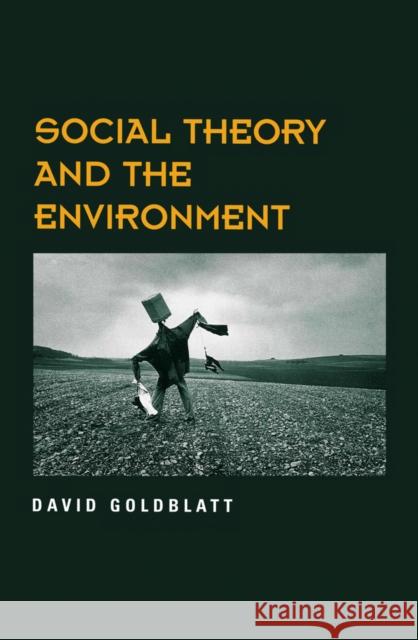Social Theory and the Environment » książka



Social Theory and the Environment
ISBN-13: 9780745613284 / Angielski / Miękka / 1996 / 320 str.
Social Theory and the Environment
ISBN-13: 9780745613284 / Angielski / Miękka / 1996 / 320 str.
(netto: 97,95 VAT: 5%)
Najniższa cena z 30 dni: 101,59
ok. 30 dni roboczych.
Darmowa dostawa!
This book establishes whether contemporary social theory can help us understand the structural origins of environmental degradation and environmental politics.
"This book is a most welcome addition to the contemporary discussion of environmental issues in the social sciences. As a critical evaluation and reconstruction of its four chosen theorists, it could hardly be bettered. It is clear, rigorous, intellectually challenging and politically serious ... a fine and lasting achievement." Ted Benton, University of Essex
"Offers a welcome and timely survey of those thinkers – Andre Gorz, Anthony Giddens, Jurgen Habermas, Ulrich Beck – who have tried to move beyond the exploded belief in the "conquest" of nature and unlimited growth." New Statesman and Society
"David Goldblatt has done us the large favour of starting from the other end of the story. Rather than using environmentalism to shore up a set of conclusions arrived at elsewhere, he starts with the two main questions posed by environmentalism – the structural origins of environmental degradation and the conditions under which environmental movements might ameliorate or prevent that degradation – and examines the work of four contemporary social theorists to see what answers they provide. Goldblatt′s own analysis is thoughtful, well argued and has a painful honesty to it; even when it appears that conclusions do not please him, he follows them through to the end. In this thoughtful book, David Goldblatt has helped us to move towards some answers." Times Literary Supplement
"An academically thorough and at the same time readable assessment of relevant writings of Anthony Giddens, Andre Gorz, J%uuml;rgen Habermas and Ulrich Beck. The discussions of individual theorists would work well as stand–alone chapters, and would provide students with very good starting points in each case ... ideal for student reading lists on environment–related social science courses." Environmental Values
"Highly engaging review of current developments in social theory ... this book is a testimony to the vigour and creativity of the discipline′s response to the environmental challenge. His writing is refreshingly clear and points are made cogently and logically." International Journal of Environmental Studies
"The conclusion is the most interesting chapter, because in it Goldblatt brings together his own arguments." Environment and Planning
′David Goldblatt′s book is a welcome and scholarly contribution to a growing socialist literature in what may broadly be termed political ecology ... Goldblatt′s main acheivement ... is to draw together the disparate conceptual apparatus of modern European social theory and then to show how it provides the necessary foundation for a critical political ecology.′ Capital and Class
′Social theorists may need to head in such directions given the place that Goldblatt, carefully and convincingly, leads us to.′ Urban Studies
Preface.
Introduction: Social Theory, Environmental Degradation and Environmental Politics.
1. Capitalism, Industrialism and the Transformation of Nature: Anthony Giddens.
2. Urbanism, Globalization and Environmental Politics: Anthony Giddens.
3. The Political Ecology of Capitalism: Andre Gorz.
4. Social and Cultural Origins of Environmental Movements: Jurgen Habermas.
5. The Sociology of Risk: Ulrich Beck.
Conclusion: Social Theory, Socialism and the Environment.
List of Abbreviations.
Notes.
Bibliography.
Index.
David Goldblatt is a lecturer in the Faculty of Social Sciences, at the Open University.
Environmental degradation is no longer a peripheral concern of the social sciences and contemporary politics: it is an unavoidable and pressing reality. This book seeks to establish whether contemporary social theory can help us understand the structural origins of environmental degradation and environmental politics.
The book opens by arguing that the historical bequest of classical social theory is very limited. Marx, Weber and Durkheim lived long enough to witness the environmental consequences of modern economic growth but died too soon to witness its long term consequences and the growth of political resistance. Goldblatt attempts to transcend the limits of that tradition through a critical investigation of the work of Anthony Giddens, Andre Gorz, Jurgen Habermas and Ulrich Beck.
Social Theory and the Environment analyses the roles of capitalism, state socialism and industrialism in generating environmental degradation; the environmental implications of urbanism and globalisation; the integration of environmental questions with political economy; and the structural origins of environmental movements. It concludes with a discussion of the relationship between conceptions of socialism in social theory and its relevance to contemporary environmental politics. Wide ranging and carefully argued, this challenging text will be of particular interest to students of social and political theory, ecology and enviromental studies.
1997-2026 DolnySlask.com Agencja Internetowa
KrainaKsiazek.PL - Księgarnia Internetowa









